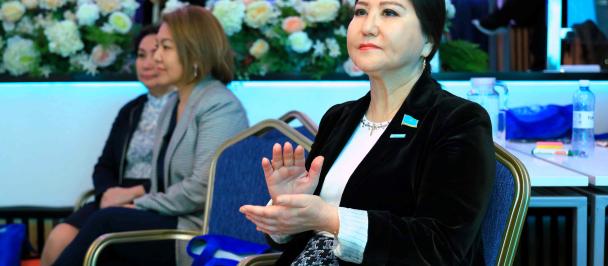Harassment at universities – both the syndrome and the root causes are key elements to weigh
November 25, 2022

On the eve of the UN global campaign “16 Days of Activism Against Gender-Based Violence”, the United Nations Development Programme and Nazarbayev University School of Humanities and Sciences joined forces to hold a seminar for students of Astana on preventing discrimination and harassment in the universities of Kazakhstan.
During the seminar issues centred on creating a safe environment and on the ability to recognize and prevent harassment in the academic environment became the leitmotif of discussions. Students studied real cases and were tasked with finding optimal solutions based on the information obtained during expert presentations.
“Today I dived into the gender agenda of Kazakhstan in detail. It was important to hear about areas where more effort is needed. I am grateful to international organizations for such sessions and, as an active citizen, I would like to popularize such events,”said Zhangeldy Beisenov, first-year student at Astana IT University eager to share his impressions.

Harassment is any form of unwanted verbal or physical behaviour, often of a sexual nature or with sexual innuendo.
According to UN Women statistics, 144 countries have laws that criminalize sexual harassment. But despite these laws, sexual harassment remains commonplace for women, regardless of their social status.
Saltanat Sanakbek, a first-year master’s student at the Graduate School of Business, Nazarbayev University, notes that,
“The first step I can take is to start talking about the issue – at the university, at home, in my community – to share the knowledge gained with my close circle, my classmates.”
Harassment on university campuses has one peculiarity – it can be hushed up. For there is a clear top-down relationship between faculty and students which often puts students at a disadvantage if harassment does occur.

Welcoming the participants, the President of Nazarbayev University, Shigeo Katsu, highlighted the importance of the seminar and the relevance of the topic not only for the academic environment, but also for society per se.
“This is something we should all discuss together. The worst thing is to pretend it doesn't exist. It is important that we discuss and understand the problem, and try to see how individual women or, for example, groups of women, deal with it and develop coping strategies. It is important to consider both the syndrome and the cause,”said Mr. Shigeo Katsu.
The issue of harassment in universities is part of the main problem of society concerning women and girls – gender-based violence. According to official statistics of the Astana Police Department for the Protection of Women from Violence, only in the first nine months of this year, police received more than 14,000 appeals from citizens regarding domestic abuse.

Speaking to students, Gulmira Shrakhmetova, Senior Inspector of the Astana Police Department for the Protection of Women from Violence, said,
“One of the critical steps that needs to be taken to eliminate violence in our society is to amend existing legislation.”
At the meeting, it was also noted that university students have the opportunity to contact the student ombudsperson and adviser on youth policy to the Minister of Science and Higher Education, Aisulu Yerniyazova, who has just started her duty and is ready to listen to students’ problems and to protect their rights. She notes that her ministry is working on the creation of the National Union of Students, whose members will raise important issues, including pertaining to gender equality.
Every year from 25 November to 10 December, the United Nations organizes the 16 Days of Activism Against Gender-Based Violence awareness campaign. This initiative is aimed at attracting public attention and at involving all parties in the quest to solve violence in society.


 Locations
Locations







